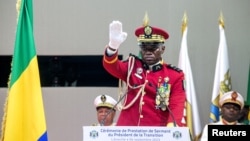Gabon’s coup leader, seeking an end to international sanctions, says he visited the Central African Republic on Thursday to explain to its president why he seized power from Gabon’s president on August 30.
Gen. Brice Clotaire Oligui Nguema, the coup leader, said he told CAR President Faustin-Archange Touadera that the military takeover was vital to free Gabon from a long, iron-fisted rule that failed to improve the living conditions of its civilians.
Nguema also said that the coup was intended to avoid bloodshed because, he said, Gabon's opposition was preparing to take up arms to defend their victory that they say President Ali Bongo Ondimba stole in the August 26 election.
Touadera is the president of the Central African Economic and Monetary Community, or CEMAC, a regional economic bloc with Cameroon, Chad, CAR, Equatorial Guinea, Gabon and Congo as members.
He also was appointed by the 11-member Economic Community of Central African States, or ECCAS, to mediate Gabon’s transition to constitutional order. ECCAS includes all the CEMAC nations as well as Angola, Burundi, the Democratic Republic of Congo, Rwanda and Sao Tome and Principe.
CEMAC and ECCAS suspended Gabon's membership after the coup and condemned the use of force to resolve political conflicts.
Nguema said his trip to CAR, after visiting Equatorial Guinea and Congo, was aimed at requesting the lifting of international sanctions, which were imposed to press for a return to democratic rule in Gabon.
The military junta needs time to restore stability, ensure sustainable economic development, conduct a national dialogue and revise the electoral code before organizing transparent and fair elections to usher in civilian rule, Nguema said.
He said Gabon citizens generally support the military for seizing power without bloodshed from Ali Bongo, who took power in 2009 following the death of his father, who had led the central African country since 1967.
CAR state TV showed crowds of Gabon citizens anxious to see Nguema during his visit. Some carried placards congratulating the junta leader for what they called his courage to save Gabon from the Bongo family's nearly 60-year rule that failed to develop the oil-producing nation.
Rigobert Antah, who was among those gathered, told Gabon state TV that he is ready to return to Libreville after spending seven years in exile in CAR’s capital, Bangui.
He said he was declared wanted by Gabon's government in 2016 for protesting when Ali Bongo claimed he had scored 49.8% of votes to narrowly defeat challenger Jean Ping, who had 48.2% of votes in that year's presidential election.
Antah said he would be grateful if the military junta hands power to civilian rule within a maximum of two years.
Nguema did not say how much time he thinks he needs to return to constitutional rule. The military junta says it will invite Gabon's citizens in exile for a national dialogue but did not say when the dialogue would take place.
Nguema promised to open an embassy in CAR to take care of the needs of Gabon’s citizens there.
The African Union and the United Nations also imposed sanctions to exert pressure on Nguema to hand power to civilians. France, China, Russia, the United Kingdom, Canada and the United States also expressed concerns about the military junta taking over and asked for a return to normalcy.




